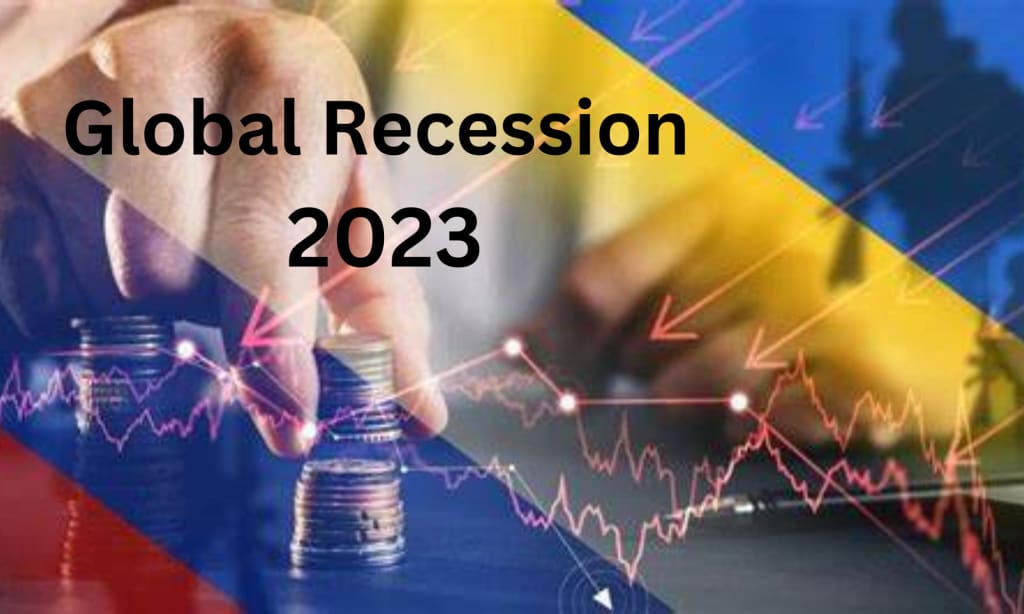Recession in 2023
reasons of recession in 2023

In discussing the potential reasons for a recession in 2023, it is important to note that economic forecasting is inherently uncertain and subject to various factors. However, based on the current economic landscape and potential vulnerabilities, several key factors could contribute to a downturn. Here are some factors to consider:
Economic Slowdown and Global Uncertainty: A significant global economic slowdown can trigger a recession. Factors such as trade tensions, geopolitical conflicts, or a decline in business and consumer confidence can dampen economic activity. In 2023, uncertainties surrounding global trade policies, political instability, or disruptions due to natural disasters could potentially contribute to an economic downturn.
Monetary Policy and Interest Rates: The actions of central banks, such as the U.S. Federal Reserve, can impact economic conditions. If central banks tighten monetary policy by raising interest rates too quickly to combat inflationary pressures, it could lead to reduced borrowing, investment, and consumer spending. Conversely, if central banks keep rates too low for an extended period, it could create asset bubbles or inflationary pressures that may be destabilizing in the long run.
Financial Market Volatility and Asset Price Corrections: Excessive speculation, overvaluation of assets, or sudden market shocks can trigger a correction in financial markets. If asset prices decline rapidly, it can lead to a loss of investor confidence, reduced wealth effect, and tighter credit conditions, negatively impacting consumption and investment. Market disruptions in sectors such as housing, technology, or cryptocurrencies could pose risks in 2023.
Fiscal Policy Challenges: The management of fiscal policy by governments can affect economic stability. High levels of public debt, inefficient spending, or inadequate revenue generation can strain public finances and limit the government's ability to respond to economic downturns effectively. Policy choices related to taxation, government spending, and budget deficits will be crucial in determining the resilience of economies in 2023.
Supply Chain Disruptions: Global supply chains are vulnerable to disruptions, such as natural disasters, political conflicts, or pandemics. These disruptions can lead to supply shortages, increased production costs, and reduced economic output. The ongoing COVID-19 pandemic and its potential aftermath, including the emergence of new variants or future public health crises, could still pose risks to global supply chains and economic stability.
Debt Levels and Financial Vulnerabilities: High levels of debt in households, businesses, or governments can create vulnerabilities in the economy. Excessive debt burdens can hinder spending and investment, leading to a slowdown in economic activity. If a significant number of borrowers face difficulties in servicing their debt, it can trigger financial distress, defaults, and a contraction in lending, amplifying the impact on the broader economy.
Demographic Challenges: Aging populations, particularly in advanced economies, can present economic challenges. Shrinking labor forces, increased pension and healthcare costs, and reduced consumer spending power can strain economic growth and stability. Countries facing demographic headwinds, such as Japan or some European nations, may experience slower economic growth or recessionary pressures in 2023.
Technological Disruptions and Structural Shifts: Technological advancements, such as automation, artificial intelligence, or digitalization, can disrupt industries and labor markets. While these shifts can lead to increased efficiency and productivity in the long term, they can also cause short-term disruptions and job displacement. The pace of technological change and its impact on employment and income inequality could influence economic performance and potentially contribute to a recession.
It is crucial to highlight that economic conditions are multifaceted and interconnected, and the interplay of these factors can be complex. Additionally, unforeseen events and the effectiveness of policy responses can shape the economic outlook. Economic forecasting is inherently challenging, and accurate predictions about recessions require a comprehensive understanding of numerous variables. Therefore, it is essential to continuously monitor economic indicators, policy decisions, and global developments to assess the likelihood and severity of a potential recession in 2023.
About the Creator
SANJOY DAS
person with roles and passions, Dad, friend, Grandpa, and Husband .
Writing ,lending my talents to help others. Spend my energy nurturing my interests and passions. The satisfaction that comes from producing work that inspires me






Comments
There are no comments for this story
Be the first to respond and start the conversation.